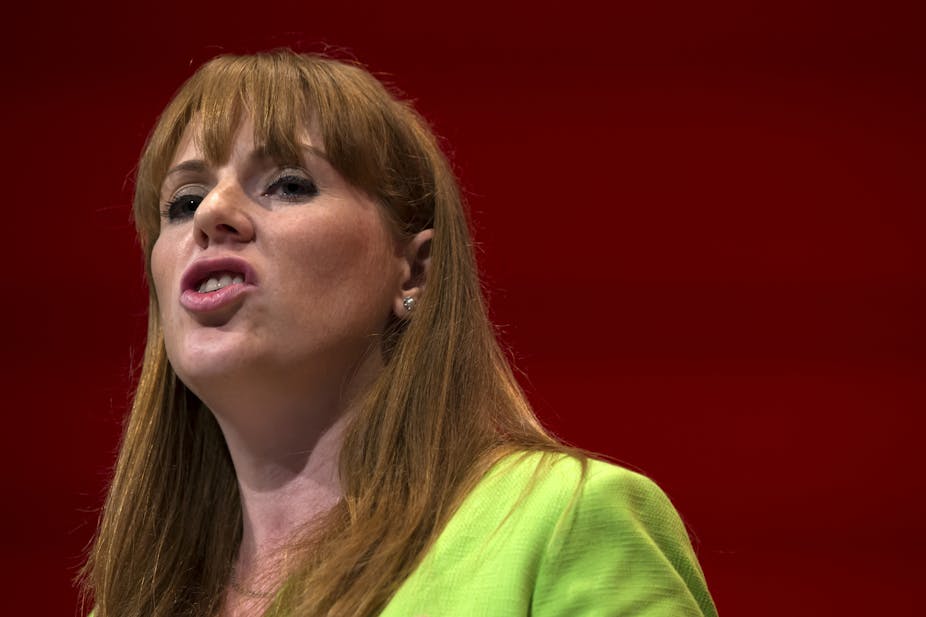British parliamentarian and shadow cabinet minister Angela Rayner has recently been the victim of online abuse because of the way she speaks.
Rayner is from (and speaks as though she is from) Stockport. She has reported receiving several emails saying that her accent makes her sound “thick”.
The abuse she has experienced seems strange at a time when politicians are routinely criticised for being out of touch. After all, what better way is there to show you are “one of the people” than speaking like your constituents, with an appropriate regional accent?
It should be pointed out that “regional” in this context refers to “not south-east England”. The great injustice of British English accents and dialects is that those which emanate from outside the traditional seat of English power (London – Oxford – Cambridge) are seen as different or regional, despite the southern “standard” variety being in no way linguistically superior. The result of this arbitrary distinction is that a certain type of southern English accent is routinely viewed as the norm and even something to aspire to, while northern (and other regional) accents, such as Rayner’s, are seen as something that will hold you back.
That’s probably why these regional accents have traditionally been few and far between at the top of British politics. Every now and then, a Scottish accent might rise to the top but then Scottish accents, in England at least, tend to avoid being embroiled in the same social class connotations as English accents.
If we look at the current cabinet there are only five ministers (Liam Fox, Alun Cairns, David Mundell, Justine Greening, Karen Bradley) with noticeable regional accents. None are particularly strong, just noticeable. There are a few more with just the occasional regional feature (usually a rhyming vowel in “trap” and “bath”) but nothing more.
The shadow cabinet shows more linguistic diversity. There are at least eight regional accent speakers (Angela Rayner, Dave Anderson, Jon Trickett, Richard Burgon, Andy McDonald, Jon Ashworth, Jo Stevens, Barry Gardiner), seven of whom have accents other than Scottish. Again, a few more have the occasional regional feature, bringing the total to around 13. In addition, the strongest Labour accents are much more obvious than the strongest Conservative accents.
Of course this difference should perhaps not be surprising, given the traditions of the two parties, and the system for promoting MPs to cabinet positions. In recent history the Conservatives have tended to get most of their support in the south of England where “standard” English dominates, while Labour support has come from the north. If we then factor in the preference for cabinet positions tending to go to MPs in safe seats (or prospective cabinet ministers being drafted in to safe seats), the pattern becomes clear.
Then there is the issue of social class. Although the situation is not as clear cut as it was 50 years ago, there is still a perception of the Conservatives catering for the middle (and upper) classes and Labour fighting for the working class. And if there’s one aspect of a person’s identity that betrays social class above all others, it’s the way we speak.
By and large, the higher up the social scale you go, the less regional variation there is in speech. Add to this the idea that some people will actively seek to lose any accent they have as they aspire to greater social positions, while others will consciously maintain theirs to show loyalty to their ideological working class roots, and the divide becomes stronger.
Keeping it real
It’s also curious that Rayner has been singled out for special attention. It’s not as if she has the strongest accent of her shadow cabinet colleagues. That distinction must surely be awarded to Dave Anderson, whose Sunderland accent is consistently strong. Perhaps he also gets stick, but it’s hard to find any reference to it if he does.
Rayner and Anderson are actually two of very few cabinet and shadow cabinet members whose accents “match” their constituency. The reason this is relevant is that sharing an accent with your constituents is surely a positive attribute with regard to underlining your status as their representative in parliament.
It’s not disastrous for the country that there are so few strong regional accents in parliament, and to criticise the non-“regional” speakers for reflecting their social world is no better than criticising Angela Rayner for reflecting hers. But it does seem a shame that we are so quick to focus on how someone says something rather than what is being said, especially when the accent is so genuine. We should, perhaps, be far more wary of those who suddently take on an unfamiliar sound, however well-intentioned.

